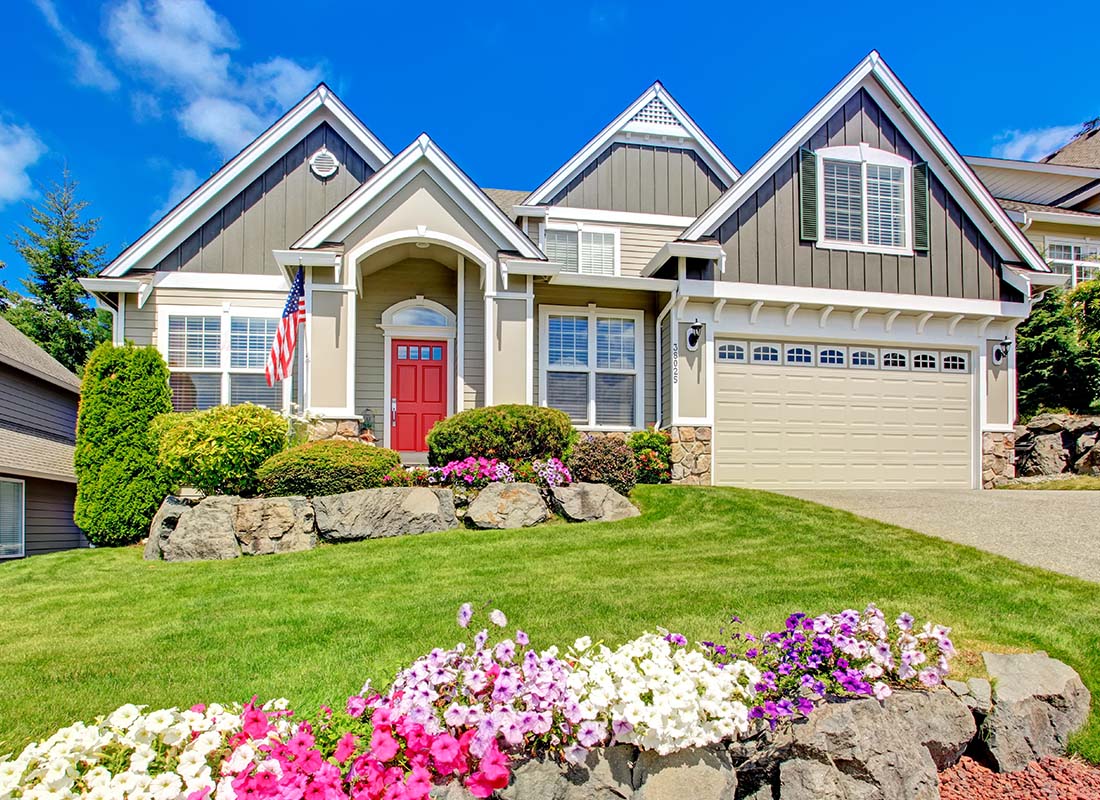
Every home is different. Consider home insurance that’s unique to you.
Get the insurance your home needs.
Your home is the center of your life. It’s also your biggest investment. That’s where home insurance comes in, covering the unique risks you face. We’ll help you find a policy that protects you from the small and large risks related to owning a home. Because it’s more than just a house, it’s your home.
What are the risks your home faces?
Imagine if your house caught on fire. Not only would you lose your home, but you’d also be burdened financially and emotionally. Without adequate home insurance, you would be left with no way of raising the funds to pay off the balance of the mortgage. That’s why it’s important to have a homeowners insurance policy that covers your risks and fits your needs. It may also protect you from more common things like pipe leaks and property damage. Even small issues can add up, and having coverage helps you protect your biggest investment.

Most fires are devastating. Besides the emotional impact, the physical damage to your home can be significant. If you lost your home to fire, do you have adequate insurance to replace your home and its contents? Remember, inflation rates on building materials and construction costs rarely track with real estate values. As a result, rebuilding a home can often cost significantly more than expected.
Make sure your homeowners policy contains replacement cost coverage with no cap. This protects you if the cost to reconstruct your home is higher than your current limit of coverage. And, be sure that your insurance includes rebuilding your home to code. Very often, local ordinances and building codes change over time, which may require additional costs.
When your home suffers damage due to an unexpected event, your personal property is also at risk. Furniture, appliances, clothing, electronics, and other personal items can also be damaged or destroyed.
Your homeowners insurance policy typically covers personal property, including the contents of your home and other personal items owned by you or family members who live with you. Make sure your homeowners policy includes replacement cost coverage for personal property so that you always receive the full cost to replace whatever item is damaged.
When there is substantial damage to your home due to unexpected events such as lightning, fire, or a storm, you may not be able to live in your home until it can be repaired or rebuilt–potentially incurring additional living expenses for lodging, food, and other daily needs.
Ensure that your homeowners insurance policy provides additional living expense or loss of use coverage to compensate you for the additional costs you incur for reasonable housing and living expenses if a covered event makes your house temporarily uninhabitable while it's being repaired or rebuilt.
Typically, there is a sublimit on homeowner insurance policies for valuable possessions, such as jewelry, furs, fine arts, and other collectibles.
Obtain a personal floater or schedule your valuable possessions to ensure you’ll have the money to replace them.
If a guest is injured while on your property, even when it’s due to a friendly game of baseball, you may be required to pay any medical expenses associated with their injury.
Your homeowners policy should include medical expenses coverage to take care of injuries and treatment - generally not of a serious nature. In the event a person is injured on your property and requires medical attention, you would be able to submit the injury-related medical expenses to your insurance carrier. Medical expenses are usually paid without a liability claim being filed against you.
In the unfortunate event that someone slips and falls while on your property, you and your family may be held liable for any injuries that result.
Your homeowners policy includes personal liability coverage to respond to incidents where injuries or damages occur to a third party where you may be deemed negligent. However, you should consider purchasing a personal umbrella or excess liability policy to provide additional coverage limits to protect your assets in case a lawsuit is brought against you.
The fun that comes with having a trampoline in your backyard can also be accompanied by serious risks, which may not be covered under your standard homeowners insurance policy since coverage varies from state to state and between insurance companies.
You should make sure your homeowners insurance policy covers your trampoline, as many insurance providers refuse to take on trampoline liability and exclude the item from coverage.
Young people are usually very active online. However, using social media and other sites can increase the possibility of them directly or indirectly damaging someone's reputation and exposing you, the parent, to a lawsuit.
Your homeowners insurance policy includes liability coverage for property damage caused by any member in the family, but likely does not cover rumors or statements that damage a reputation. You may need to seek additional coverage to include liability protection that covers personal injury or defamation.
You invite guests over for a pool party and one of your guests dives into the shallow end of the pool and is permanently injured. They hire a lawyer to represent them and after a long legal battle, you and your family are left financially responsible for their injuries. Do you have enough money in savings to cover your legal responsibilities as well as the legal defense costs?
An umbrella or excess liability policy increases your personal liability limits by adding protection over and above your current auto, boat, or homeowners policies-providing financial value and security. Excess liability insurance is available either by an endorsement to your homeowners policy or available as separate coverage.
You do not have to live near a body of water to suffer loss due to flooding. With the changing weather patterns and more damaging storms occurring around the globe, flood losses are becoming more common in places that are not normally prone to flood damage. Your homeowners policy does not cover damage from flood. Could your home be at risk?
Purchase a flood insurance policy to protect your home and covered contents from certain types of flood losses as designated by the National Flood Insurance Program. A flood policy is purchased as a separate policy through the federal program (NFIP) or through a servicing carrier known as a write your own carrier.
Owning a secondary home has the potential of increasing your liability exposures.
Be certain that you extend the liability coverage under your homeowners policy to include your secondary home. You should also consider including the secondary home under an excess liability or umbrella policy to provide for additional liability limits.
Collector or classic vehicles often have significant value and require special documentation and unique insurance coverage to ensure they are adequately protected. Even if stored on your property, they are typically not covered under your homeowners insurance.
Insure your collector cars with a specialized insurance company that focuses on and understands the unique nature of collector or classic cars and other vehicles.
If you are a connoisseur of wine, you know that it is susceptible to outside environmental exposures that can ruin it. If the collection is damaged, coverage from your homeowners policy is a possible recourse. However, the damage is only insurable if it is a covered cause of loss as outlined in your homeowners policy. A deductible would also apply.
If you have a sizable wine collection, you may want to consider scheduling the collection on your homeowners policy. Doing so expands your coverage and eliminates the deductible in case of a loss. You can also consider unique coverages for wine, such as for spoilage.
Whether entering from outside your home from a flood or from within your home’s plumbing system, water damage is the most common cause of loss to a home. Many policies exclude losses caused by backup of sewers and drains, and all unendorsed homeowner policies exclude damage caused by a flood.
Careful review is essential to protect your home and belongings from all sources of water damage. We recommend coverage solutions from insurance companies that include backup of sewers and drains. Also, identify cost efficient solutions to address the risk of flood damage in the first place.
Surprisingly, standard auto insurance does not cover personal property or contents stolen from your car.
Most homeowners policies offer an option to include off-premises theft coverage as an endorsement, which covers you for theft of your personal property away from your residence.
Every home is different, your coverage should be too.
Finding coverage for your unique needs may seem overwhelming. There’s no one-size-fits-all solution, but there are many coverage options that may work for you. Home insurance policies cover a range of options tailored to fit the needs of your home and lifestyle. When reviewing your options, consider the following coverages:
- Additional Living Expense/Loss of Use
- Collectible Cars
- Excess Liability Coverage
- Fire
- Flood Coverage
- Jewelry, Fine Arts and Collectibles
- Medical Expenses
- Miscellaneous Coverage
- Off-Premises Theft
- Personal Injury
- Personal Liability
- Personal Property/Contents
- Property Damage
- Secondary Home
- Umbrella
- Water Back-Up
- Wine Collection
Is your home protected?
Does your current home insurance cover your needs? Chances are, it doesn’t. We’ll work with you to determine the risks your home faces and help you find customized coverage to fit your specific needs. Because whether you live in a one-story house or a mansion, it’s the place you call home. And your home deserves to be covered with insurance that’s more than the bare minimum.
Are you looking for home insurance to protect your biggest asset? Contact us to discuss homeowners coverage options for your needs.
Let’s Get Started
Home Insurance Information Request
"*" indicates required fields
Don’t like forms? Call one of our locations today.
